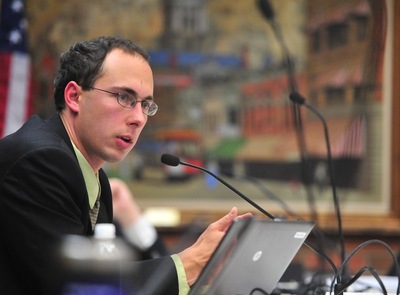As video surveillance technology becomes more sophisticated and prevalent, Ann Arbor City Council Members Mike Anglin and Chuck Warpehoski argue there's a need to establish a regulatory framework that balances privacy protections and law enforcement needs.
The two 5th Ward council members put forward a new video privacy ordinance for consideration Monday night, but it ultimately was postponed by council until early July.

Ann Arbor City Council Member Chuck Warpehoski, D-5th Ward, tried to convince his colleagues to support a proposed video privacy ordinance Monday night, but others weren't comfortable moving it to second reading.
Ryan J. Stanton | AnnArbor.com file photo
Under the ordinance, public surveillance cameras that would be in place more than 15 days in residential areas could be installed only if two-thirds of nearby residents give written permission.
The cameras could be used for up to six months with an option for renewal. If there are no residents within 300 feet, the camera could be installed for up to a year with an option for renewal.
Public surveillance cameras that would be in place for 15 days or less could be installed at the discretion of the city administrator to address a specific criminal problem.
"The ordinance as presented is a rigorous effort to strike a balance between the needs and desires of city's law enforcement community and the privacy needs of our citizens," Warpehoski said, adding he's been hearing some people ask for a complete ban on municipal video surveillance and other people arguing the city shouldn't be tying the hands of the police department.
"When you pass ordinances to tie your own hands, it just doesn't make a whole lot of sense, especially when there isn't a problem," said Council Member Stephen Kunselman, D-3rd Ward.
"We know all too well these surveillance cameras — when they're addressing real problems — do work," he added. "You only have to listen to the issues over in West Willow where the neighborhood is asking for this, and it is working when they want surveillance cameras to deter crime."
Council Members Sumi Kailasapathy, D-1st Ward, and Jane Lumm, an Independent from the 2nd Ward, also said they weren't entirely comfortable with what's being proposed.
Lumm said too many fundamental questions remain unanswered. She said she's not going to support the ordinance until she hears from Police Chief John Seto that he has no objections and that it does not compromise the police department's ability to do its job.
"While I understand that protecting public privacy is important, I also understand that surveillance is an essential and critical tool in police work, solving and preventing crimes, and we only have to look at the recent events in Boston to see confirmation of that," Lumm said.
"And most importantly, I trust the Ann Arbor Police Department and Chief Seto to judiciously and appropriately use surveillance cameras, balancing their need to optimize law enforcement while protecting privacy, and I'm not entirely convinced that this ordinance is necessary at all. No other municipalities in Michigan have an ordinance similar to this."
The ordinance would provide notice requirements for short-term and long-term installations of surveillance cameras, including onsite notice.
If a private residence is in a public surveillance camera's visual range, the ordinance states residents of the property must give written permission before a camera is installed.
Public surveillance cameras could not be used for live-monitoring, except in well-defined emergencies. Audio recording also would not be permitted.
Access to surveillance recordings would be limited to employees of the police department and attorneys involved in criminal proceedings. After 90 days, surveillance recordings would be deleted unless they were part of an ongoing investigation.
When a public surveillance camera is removed, a report on its effectiveness would be published on a public website.
The ordinance wouldn't regulate cameras that monitor city buildings and storage areas, cameras used for entertainment events or traffic studies, or private use of video surveillance cameras.
Ryan J. Stanton covers government and politics for AnnArbor.com. Reach him at ryanstanton@annarbor.com or 734-623-2529. You also can follow him on Twitter or subscribe to AnnArbor.com's email newsletters.